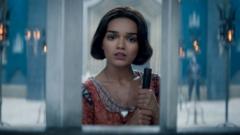Rachel Zegler's portrayal of Snow White has ignited backlash and polarized opinions, thrusting the young actress into the spotlight for reasons beyond her performance, intertwining race, politics, and the film industry's cultural climate.
Rachel Zegler: At the Center of Snow White's Controversy

Rachel Zegler: At the Center of Snow White's Controversy
Disney's latest live-action Snow White adaptation, loaded with debate, highlights the scrutiny faced by lead actress Rachel Zegler amid cultural tensions.
Disney's live-action Snow White, which recently hit theaters, has not only faced scathing reviews but also thrust its star, Rachel Zegler, into a maelstrom of controversy and debate. Critics and audiences are polarized, with some blaming Zegler for the film's lukewarm reception, while others defend her against what they see as an unfair targeting rooted in cultural wars.
At just 23 years old, Zegler has found herself in the firing line long before the film's release. Critics blasted her for her views on the original Snow White, in which she stated that the 1937 version is "extremely dated," emphasizing the need for a modern adaptation reflecting contemporary attitudes toward women and love narratives. These comments have sparked outrage, as many fans feel they undermine the nostalgia associated with Disney's classic.
In addition to her critiques of the original film, Zegler's political opinions, particularly her comments against Donald Trump and his supporters, have multiplied her unpopularity among certain groups. The daughter of Snow White producer Marc Platt vented frustration on social media over her political engagement, claiming it had damaged the film's box office performance. With critics labelling her views as a "woke tirade," Zegler’s remarks have made her a focal point of a broader discussion about representation and societal changes in the film industry.
Film critic Kelechi Ehenulo pointed out that Zegler's identity as a Latina actress also prompts intensified scrutiny, claiming that ambitious actors from marginalized backgrounds frequently become scapegoats amidst these politically charged discussions. Some industry insiders suggest that this backlash reflects deeper issues within Hollywood, where diverse voices continue to face resistance and hostility.
The debate surrounding Zegler also raises concerns about the treatment of women in the industry. There is a growing realization that young female stars are often subject to harsh public criticism that is rarely directed at their male counterparts. This observation offers insight into the systemic discrimination that women, particularly women of color, face in the entertainment world.
While Zegler navigates this tumultuous landscape, she continues to secure significant roles, including a planned performance in Evita on the West End. During a recent children's programming segment, she offered a message of empowerment, urging young viewers to embrace their uniqueness. As her career progresses, it remains to be seen how she will navigate the evolving dynamics of Hollywood, impacted as they are by her experience and public perception.
In summary, Rachel Zegler's casting in Snow White has become a litmus test for evolving narratives in Hollywood, reflecting the intersection of cultural representation, political discourse, and the challenges faced by women in the public eye. As the industry grapples with its traditions and the demand for modern storytelling, the stakes for actors like Zegler remain high amidst an evolving media landscape.




















